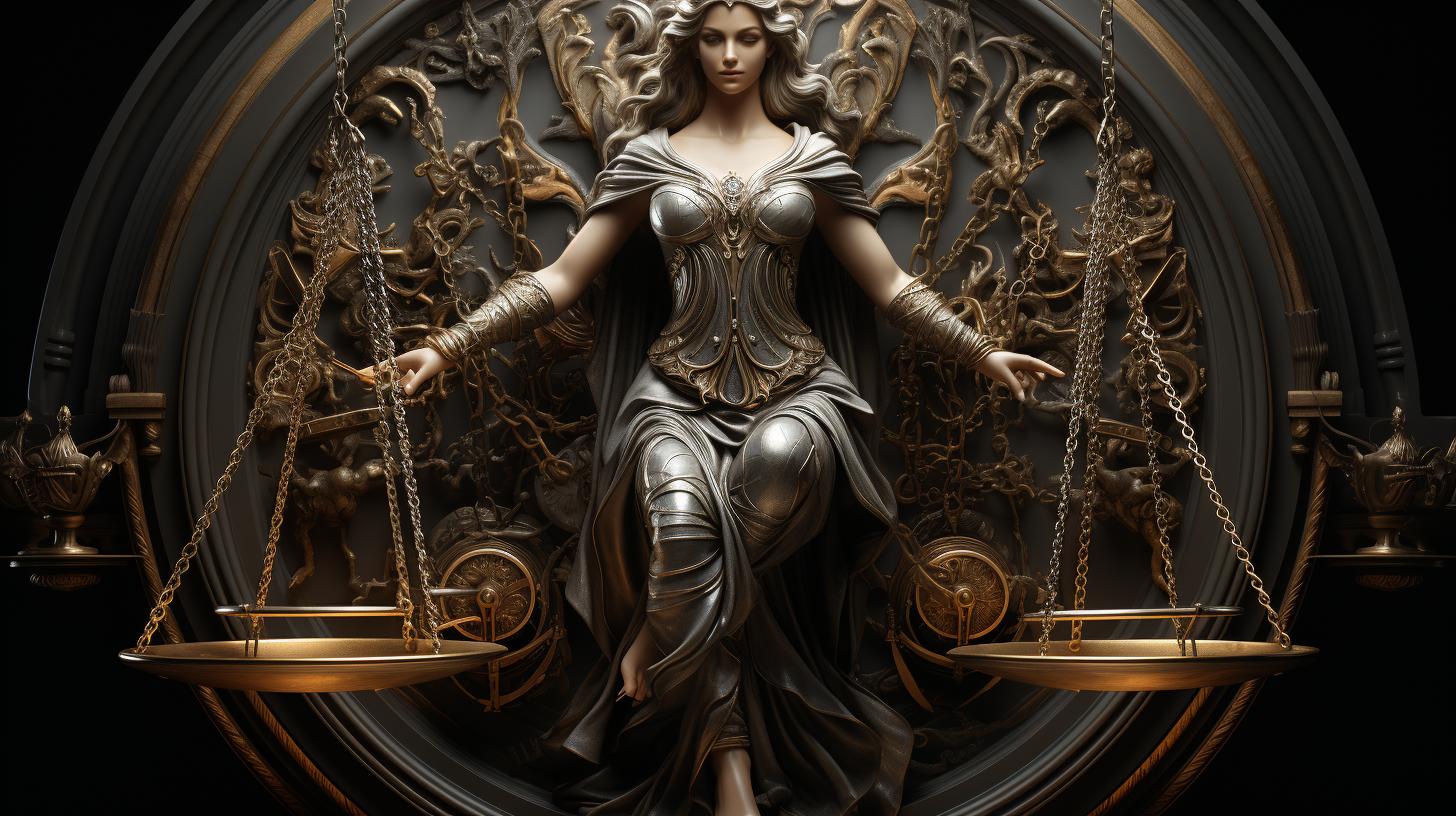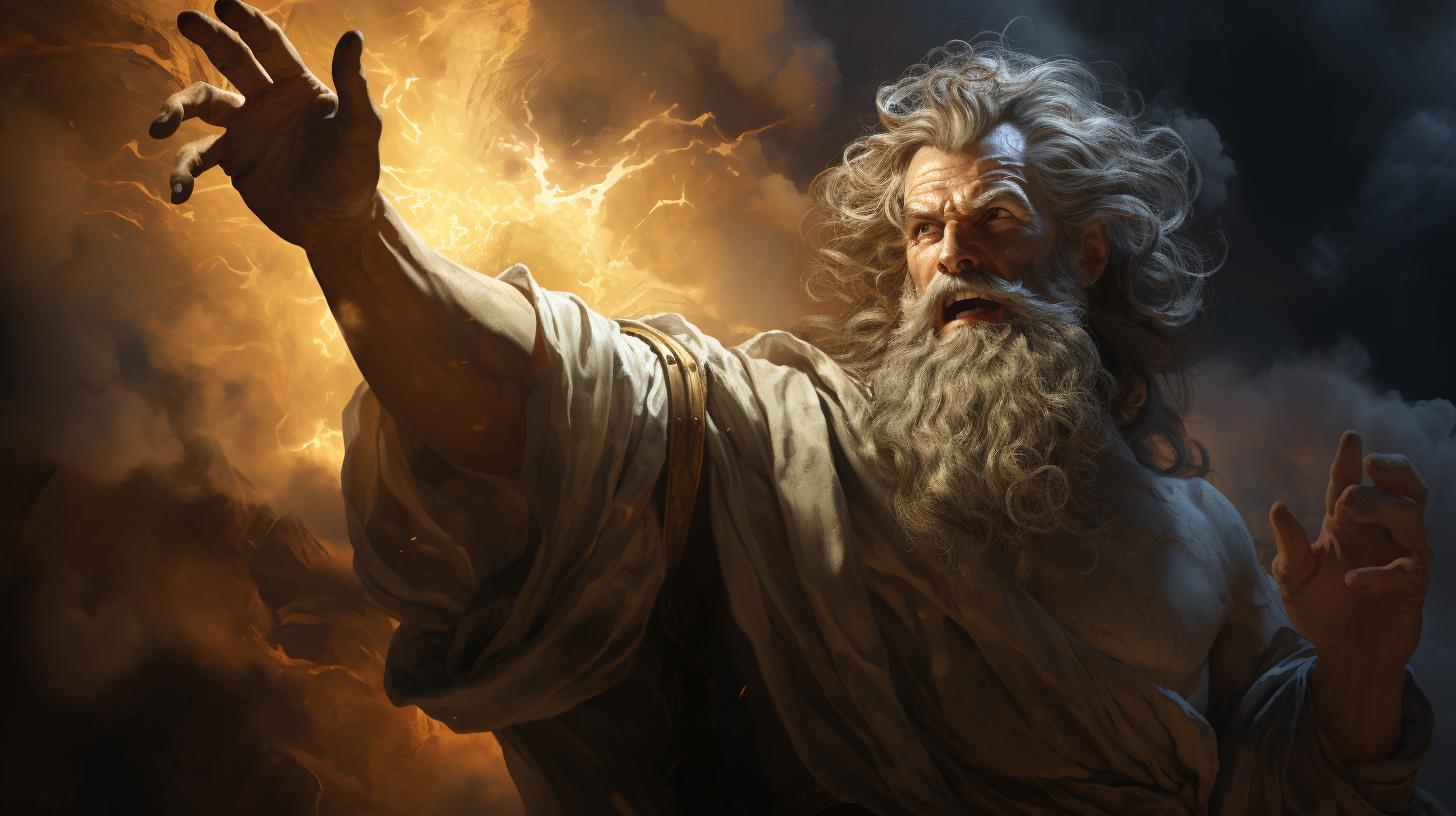Exploring Themis: The Titan of Greek Mythology and the Essence of Justice in Ancient Greece

Themis, the Titan of Greek mythology, is renowned for her association with justice, divine order, and the law. As the second wife of Zeus and the mother of the Horae and Moirai, she holds a significant role in the realm of gods and mortals.
Revered in temples and revered as “Lady Justice,” Themis wields a balanced scale, symbolizing the fair judgment she delivers. With an oracular presence at the famed Delphi Oracle, Themis played a vital role in shaping the customs and familial order of ancient Greece.
Her influence endures in both art and legal systems today.
Mythology in Themis’ Story
Themis, a prominent figure in Greek mythology, holds a rich backstory and plays a significant role in the ancient tales. Let’s explore her origins, her impactful role, and the hierarchy of the Titans.
Background and Origins: Gaia and Uranus
Themis, the daughter of Gaia and Uranus, emerges from the divine lineage of Greek mythology. Gaia, the primordial goddess of the Earth, and Uranus, the personification of the sky, gave birth to a generation of Titans, who ruled during the Golden Age.
Themis’ Role in Greek Mythology
Themis is renowned for her association with justice, order, and divine law. As the goddess of justice, she ensured that the right order prevailed among gods and mortals alike. Her impartiality and insight made her a trusted confidante and advisor.
The Titans and Their Hierarchy
Among the twelve Titans, Themis stands as one of the notable figures. This ancient race of gods and goddesses preceded the Olympians and held immense power and influence. Chronos, the god of time, and Rhea, the mother of the gods, were among Themis’ siblings.
- Themis’ siblings included prominent Titans like Chronos and Rhea.
- These ancient Titans held immense power and influence.
- Their reign preceded the rise of the Olympian gods.
The Cult of Themis
Themis, the Titan of Greek mythology, commanded devoted worship and veneration throughout ancient Greece.
From revered temples to sacred rituals, her presence permeated the religious practices of her followers.
Worship and Veneration of Themis
The worship of Themis involved acts of deep reverence and respect towards the goddess of justice. Her followers sought divine guidance and protection, believing that upholding her principles would bring order and fairness to their lives.
Themis’ Oracle at Delphi
As a significant figure in Greek mythology and the guardian of divine order, Themis played a pivotal role in the renowned Oracle at Delphi. Pilgrims from far and wide sought her prophetic wisdom, and it became a sacred site where Themis delivered oracular messages and insights into the future.
Religious Practices and Rituals
In honoring Themis, adherents engaged in various religious practices and rituals. These observances aimed to establish harmony, uphold justice, and maintain societal order in accordance with her teachings. Offerings, prayers, and sacred ceremonies were conducted in her presence, reinforcing the connection between mortals and the divine realm.
Some key religious practices and rituals associated with Themis include:
- Offering libations and sacrifices to honor Themis
- Performing purification rituals to cleanse oneself spiritually before engaging with the divine
- Participating in communal celebrations and festivals dedicated to Themis
- Consulting her oracle for guidance on important matters
The dedicated worship of Themis and the faithful adherence to her principles were seen as essential in maintaining societal order and upholding justice.
Themis’ Family and Relationships
Themis, the Titan of Greek mythology, played various significant roles within her family and had significant relationships with other gods. Explore the following aspects of Themis’ family and her connections to the Olympians.
Marriage to Zeus: Their Union and Offspring
Themis became the second wife of Zeus, the king of the gods. Their union brought forth several offspring who played pivotal roles in Greek mythology. Among their children were the Horae and the Moirai.
The Horae
The Horae, also known as the Seasons, were the goddesses of the natural order and the passage of time. They were responsible for maintaining the proper flow of the seasons and ensuring the cycles of nature.
The Moirai
The Moirai, known as the Fates, were three goddesses who controlled the destinies of both mortals and gods. They determined the duration and outcome of life, weaving the threads of destiny and deciding the fate of all beings.
Role as a Mother: The Horae and Moirai
As a mother, Themis played an essential role in nurturing and guiding her children. She instilled in them a sense of order, justice, and responsibility, emphasizing the importance of their respective roles in maintaining cosmic balance.
Interactions with Other Gods: Her Connection to the Olympians
Themis, as a prominent figure among the Titans, held significant interactions and connections with other gods, particularly the Olympians. Her close association with Zeus, as his wife and advisor, made her an influential presence in the realm of divinities.
Her wisdom and counsel were sought by many, and she often played a crucial role in mediating disputes and maintaining harmony among the gods. Her deep understanding of justice and divine order made her a respected figure amongst her peers.
Themis’ connections to other Olympian gods extended beyond her relationship with Zeus. She maintained close ties with other influential deities such as Athena, Apollo, and Hera, as they recognized her authority and sought her guidance in matters concerning justice and prophecy.
Overall, Themis’ familial relationships and interactions with other gods contributed to her significant role within Greek mythology, ensuring the preservation of order, justice, and divine balance.
Symbols and Representation of Themis
Themis, the Titan of Greek mythology, is symbolized by various elements that represent her role as the goddess of justice and order.
The Balanced Scale: Symbol of Justice
In Greek mythology, Themis is commonly depicted holding a balanced scale, representing her role as the embodiment of justice. The scale signifies the impartial weighing of evidence and arguments, ensuring fair judgment and the maintenance of divine order.
It symbolizes the importance of fairness and equality in decision-making processes.
Themis as Lady Justice in Iconography
Through the ages, Themis has been portrayed as Lady Justice, a powerful symbol deeply ingrained in Western cultures. Lady Justice is often depicted wearing a blindfold, wielding a sword in one hand to represent authority and holding the balanced scale in the other to symbolize impartial judgment.
This iconic representation reinforces the principles of objectivity and fairness in legal systems.
Significance of the Name Themis in Greek Society
The name “Themis” holds profound significance in Greek society. Its etymology suggests a connection to established customs and traditions within a community. Themis’ influence extended beyond the realm of justice, as she played a crucial role in defining the proper order of the family and the divine hierarchy.
Her name represents the adherence to social norms, providing a framework for harmonious relations between gods and mortals.
- Themis’ balanced scale symbolizes fair judgment and the maintenance of divine order.
- The iconic portrayal of Themis as Lady Justice reinforces the principles of objectivity and fairness in legal systems.
- The name “Themis” holds significant cultural value, representing adherence to established social norms and customs.
Legends and Stories Surrounding Themis
Themis, the Titan of Greek mythology, is entwined in numerous captivating legends and tales.
These stories shed light on her involvement in pivotal events and her influence on the cosmic order. Let’s explore some of the intriguing narratives surrounding Themis.
Themis’ Involvement in the Trojan War
During the legendary Trojan War, Themis played a significant role with her prophecies and foresight. She foresaw the conflict’s outcome and the fall of Troy, influencing the decisions of both mortals and gods.
Her wisdom guided the heroes and leaders, often determining the course of the war. Themis’ involvement in the Trojan War showcased her as a celestial mediator between humans and divine entities, wielding her divine knowledge for the greater good.
Themis and the Order of the Universe
Themis is closely tied to the order and balance of the universe. According to myth, she was among the Titans who maintained harmony within the cosmos. Themis, with her deep understanding of divine laws and justice, ensured that the natural order prevailed.
She fostered the principles of right and wrong, ensuring that each action had its proper consequences. Her role in maintaining the order of the universe depicted her as a guardian of cosmic justice and equilibrium.
Other Myths and Tales Featuring Themis
Beyond her involvement in the Trojan War and her connection to the cosmic order, Themis starred in various other intriguing myths and tales. One such tale tells of her involvement in the birth of Zeus, hiding him away from his father, Kronos, to protect him.
Another myth portrays her crucial role in the establishment of laws and customs in human societies, ensuring fairness and social order. These stories celebrate Themis as a deity deeply intertwined with the complexities of mortal and divine life, shaping the world as we know it today.
Themis’ Impact and Legacy
Themis, the Titan of Greek mythology, left a lasting impact on various aspects of ancient Greek society, which continues to resonate in modern times. Her influence can be seen prominently in legal systems and the concept of justice, as well as in literature, art, and popular culture.
Influence on Legal Systems and Concepts of Justice
- Themis’ embodiment of justice and fair judgment contributed significantly to the development of legal systems in ancient Greece. Her principle of balance and impartiality served as the foundation for establishing equitable laws.
- Many legal principles and concepts, such as the presumption of innocence and the right to a fair trial, can be traced back to the influence of Themis.
- The enduring symbol of the balanced scale used in courts of law finds its origin in Themis, reflecting the importance of unbiased judgment.
Themis in Literature and Art
Themis’ captivating presence also found its way into the realm of literature and art, where her character inspired numerous works:
- She served as a muse for ancient Greek playwrights, who explored themes of justice, divine order, and the consequences of disregarding Themis’ principles.
- Artistic representations of Themis often depicted her holding the balanced scale and portrayed her as a symbol of moral rectitude and the rule of law.
- Famous literary works, such as Aeschylus’ “Oresteia,” showcase Themis’ role and her impact on the fates of gods and mortals alike.
Her Enduring Presence in Modern Culture
Despite the passage of millennia, Themis’ influence remains prevalent in modern culture:
- The iconic image of Lady Justice, with a blindfold and a balanced scale, is a direct representation and adaptation of Themis.
- Her name, Themis, continues to resonate as a symbol of established customs and social order in various spheres of society.
- Themis’ enduring presence in popular culture can be witnessed through her appearances in literature, films, and other media, where her role as the guardian of justice still captivates audiences.
In conclusion, Themis’ impact and legacy extend far beyond the realms of ancient Greek mythology.
Her influence on legal systems, concepts of justice, literature, and art continues to shape our understanding of fairness and moral order in society. As we approach the year 2023, Themis’ enduring presence serves as a reminder of the timeless importance of impartiality, balance, and the pursuit of justice.
.




















